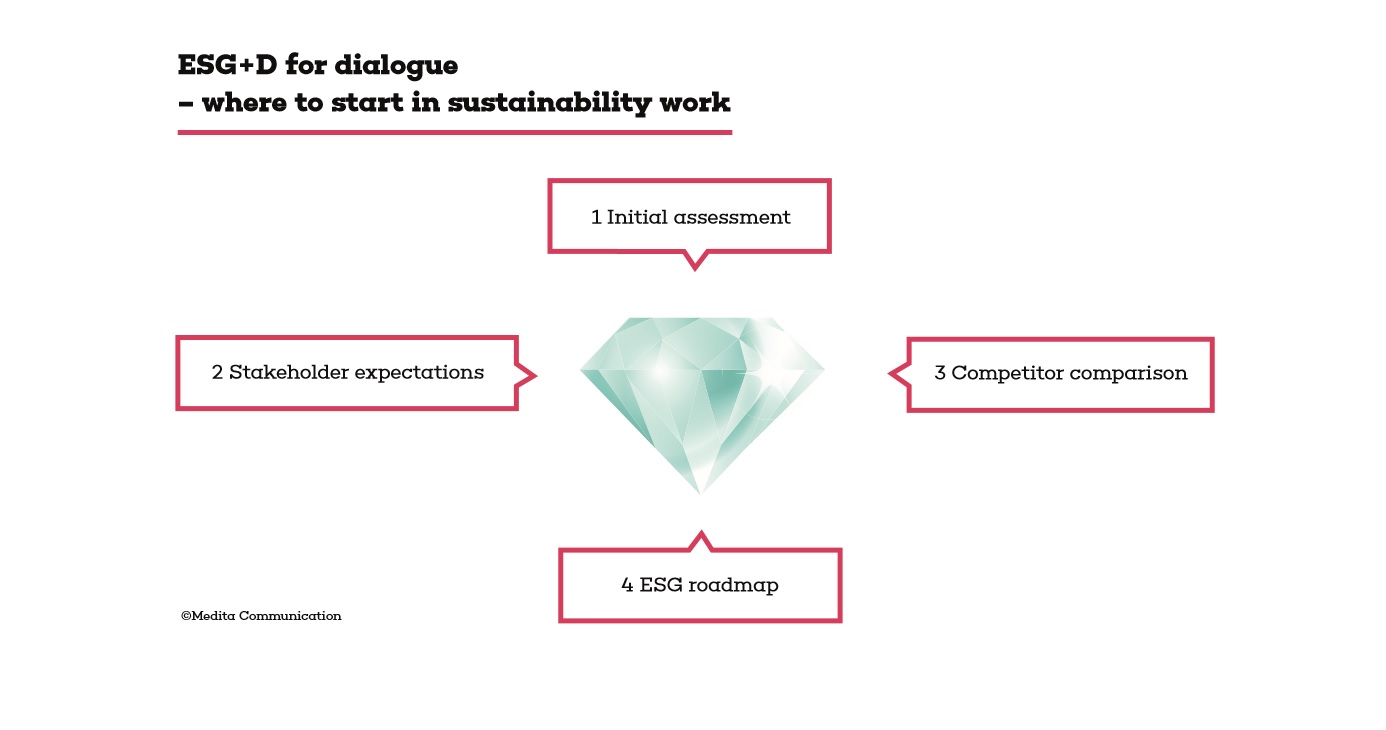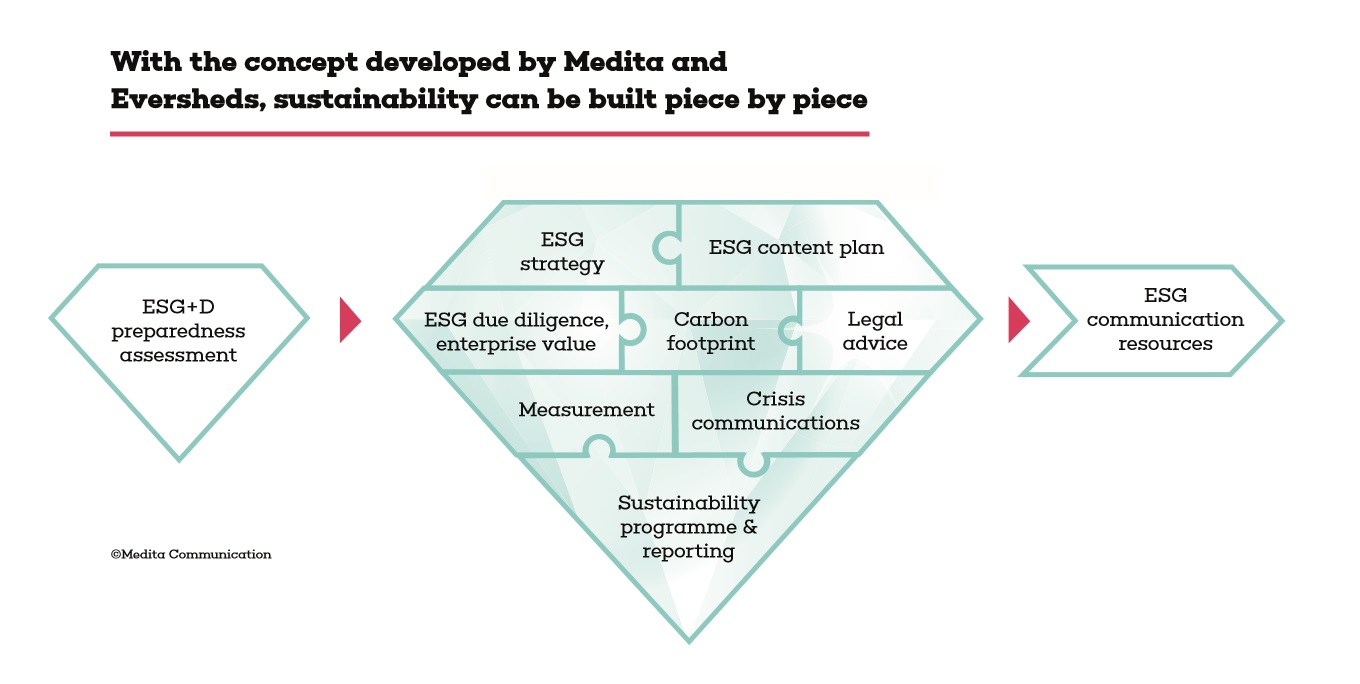Managing ESG risks and opportunities
Environmental, social and governance factors, ESG, will be increasingly regulated in the coming years, but there is no point just sitting around waiting for it to happen. Big customers, banks, investors, suppliers, employees and consumers are not waiting either. They are already making their own decisions based on the sustainability of companies and products. Evidence is required, for example, in tenders, loan negotiations and acquisitions.
Where to start in improving ESG preparedness?
A practical and understandable way to get started is to first create a situational picture using analytical communication tools, as has been done in the service concept developed jointly by Medita Communication and Eversheds law firm.
- The first step is to compile data on the company’s initial situation that is material in terms of ESG and stakeholder dialogue.
- Communication expertise is used to look into the organisation’s existing policies, commitments or quality certificates as well as surveys on the customer and employee experience from different data sources.
- Next, comparison data on the ESG communication and preparedness of peers is sought from public sources. If needed, we will help draw up a sustainability programme to serve as the basis for future reporting, or we will assess the opportunities for developing reporting.
- An ESG roadmap, including recommendations for follow-up measures, is attached to the non-sugar-coated situational picture.
Based on the situational picture, we prepare a concrete proposal for the next steps in the sustainability work.
We are happy to help you assess your ESG+D readiness
Ask for an offer
ESG also requires D – i.e. dialogue and data
When sustainable business objectives have been laid down by the company’s executive management, a schedule has been set and resources have been decided, an agile ESG communication strategy and content plan is documented to support implementation. An external multi-talented ESG communication team is also offered as required to implement the plans.
Sustainability work requires goal-oriented communications and interaction, both within the organisation and with external stakeholders. In sustainability communications, there is no point in waiting for everything to be ready. It is also important to watch out for greenwashing – unsubstantiated claims. In ESG communications, the importance of relevant and verified information cannot be overemphasised. Together with our partners specialised in different fields, we offer the services needed to develop and verify corporate sustainability.
Medita is the only Finnish partner of the global Worldcom Public Relations Group of independent PR and communications agencies. Together, we offer expert services sustainably for effective communications in 115 cities and 49 countries around the world.
ESG+D concept offers added value through sustainability
The assessment produced jointly by Medita and Eversheds shows how ESG factors directly affect the company’s value and attractiveness.
Without communications, developing sustainability will not achieve its full value, and ESG development will remain mostly a cost item. Development work protects and strengthens a company’s competitive advantages, employer image and shareholder value. Communications brings the results of this work to the attention of stakeholders, and development costs turn into a profitable investment.
ESG is a part of all corporate activities
Corporate responsibility is not a passing fashion but rather continuous, genuine acts that build trust among stakeholders. It has become an increasingly vital part of all corporate activities: management, business operations, valuation and HR policies.
Sustainability operations and promoting them have also become a key asset in terms of recruitment. Many jobseekers favour employers they consider responsible, ethical and sustainable and who match their own values.
It is important to consider why your company wants to communicate its responsibility. Is it due to pressure from the market or your own desire to act responsibly? Is corporate responsibility essential for attracting new recruits?
What about investors: do they have expectations or even demands regarding responsibility in order to protect or increase the value of their investment? Many investors see responsibility as a basic requirement, not just as added value. They also seek regular information concerning responsibility and impact.
Concrete metrics help employees, audiences, management and investors assess the direction in which your operations are moving. Clear figures are easy to understand but not always easy to produce, which is why the first steps should be taken now.
Building a responsible corporate image starts with credible actions in the various criteria of sustainable business: environmental, social and corporate governance (ESG).
Results:
- Visibility for your company’s responsible actions
- Concrete metrics and consistent communications help build your corporate image over the long term
- Investors are interested in responsible companies, potentially increasing the value of your company
- Employees feel that your corporate values match their own
- Your reputation as an employer and corporate citizen will improve
- The image of your company among the general public, including customers, will improve










